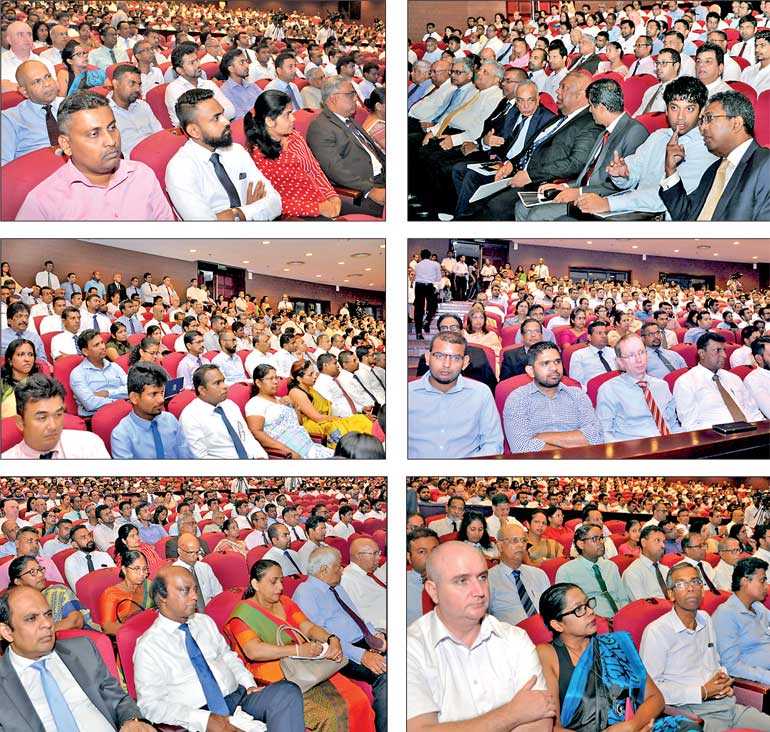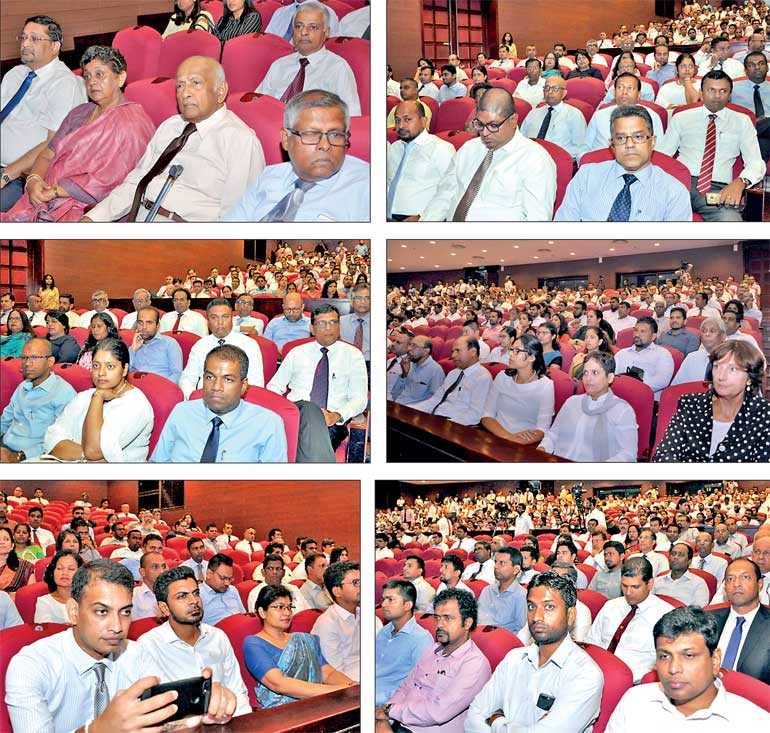Tuesday Feb 24, 2026
Tuesday Feb 24, 2026
Friday, 15 March 2019 00:00 - - {{hitsCtrl.values.hits}}

By Charumini de Silva
The 19th customary post-Budget discussion organised by Ernst &Young (EY) brought together a host of business leaders and professionals to highlight salient features of the 2019 Budget as well as to share key insights on its impact to different sectors of the economy.
It was the first post-Budget discussion and saw Finance Minister Mangala Samaraweera deliver the keynote address.
EY Partner Nishtar Sulaiman made a presentation on the highlights of the tax proposals in Budget 2019. In his remarks, he expressed optimism of stronger implementation and credited Budget 2019 with possessing policy consistency that would assist the Government to foster growth and focus on reforms —despite the temptation during an election year.
Championing free trade, entrepreneurship and reforms
Delivering the keynote address, Minister Samaraweera described it as a Budget that champions free trade, entrepreneurship and reforms.
He pointed out that the Budget, Gamperaliya, and Enterprise Sri Lanka, as well as recent Central Bank policy decisions, were concentrated on funnelling more liquidity into markets to address slow growth.
“The Government has already taken action to address the cash flow in the economy, as the Treasury has released Rs. 60 billion to settle outstanding payments to contractors, while the Central Bank has relaxed the Statutory Reserve Requirements (SRR) on two occasions, releasing a further Rs. 150 billion. Therefore, a total of over Rs. 270 billion has recently been injected into the system,” he added.
With the injection of fresh funds to revive drought and flood-affected areas, in parallel to Gamperaliya and Enterprise Sri Lanka programs, the Minister believes that the growth rate is slowly moving in the right direction and that with the 2019 Budget they can spur more growth.
“Frankly I know that the economic growth is not satisfactory, but we are optimistic. By the end of this year we expect over 3.5%, but little less than 4% GDP growth,” he said.
The Minister said that they have identified a number of structural constraints, which the Budget addresses upfront, including significant investments to upgrade skills to align human resource capabilities to match workforce demands.
“In this context, the Government is supporting approaches such as apprenticeship and internship programs managed by the private sector. Particularly in sectors such as health and IT, private sector-driven skills development programs will be supported in the form of stipends,” he stressed. According to him the Government is investing Rs. 344 billion this year for the general education sector, with a major component for improvement of curricula and skills development to suit the modern economy. He said that the budget is supporting greater participation of the non-state higher education entities, to fill the gap for students who qualify but find no placements at the Government Universities.
Samaraweera also noted that the Budget 2019 was balanced, as it contains both fiscal consolidation and reform proposals and measures targeted at elections.
“Because it is an election year, I am determined from tomorrow itself to start driving these proposals, and see how we can implement it in the shortest time possible. Despite being an election year, we are quite confident that we will be back again to continue with the work,” he added.
Liberalisation of shipping sector before October
The Minister also pledged to liberalise the shipping sector which he promised to during his last Budget in a bid for Sri Lanka to move beyond being a mere transhipment port for India.
“We are committed to reforms. One regret that I have is on liberalising the shipping sector as promised last year due to various concerns of the stakeholders in the industry. The proposal was held back because of the selfish attitude of the ‘shipping mafia’. We want to go beyond being a transhipment hub to India and be a regional hub. We are determined to bring in the necessary reforms to liberalise the shipping industry before October,” Samaraweera assured.
In terms of public infrastructure, the Minister pointed out that the transport sector requires major investment to improve efficiency and service delivery. “We have allocated significant resources to improve bus transport by enhanced technology such as GPS monitoring and digital route plans. We are also investing heavily in urban and national rail systems that include the Colombo city light rail project. This year, in total Rs. 79 billion has been allocated for investments in public transport, along with Rs. 194 billion for roads and highways,” he added.
Samaraweera said that the Budget was about transforming our nation from a feudal myopic mindset, to a modern, dynamic and prosperous society, based on the universal values of democracy, inclusivity and reconciliation.
Noting that the exchange rate has stabilised at present, as a result of foreign fund facilities, he however raised concerns over the stability of it in the coming year due to the debt repayments commencing from this year onwards.
“The rupee has stabilised for the moment, but it will be under pressure in the coming years. Next two years will be more difficult with the debt repayments,” he cautioned.
The discussion also featured Development Strategies and International Trade Minister Malik Samarawickrama, Economic Reforms and Public Distribution Non-Cabinet Minister Dr. Harsha de Silva and Finance Ministry Senior Advisor Mano Tittawela, moderated by EY Sri Lanka Partners Duminda Hulangamuwa and Ajruna Herath.
FTAs on, not off
When asked on the progress of the trade agreements that the Government is working on, Samarawickrama confirmed that all trade agreements Sri Lanka was working on were making headway, despite unfair criticism.
“There is no complication in any of the trade agreements, they are all progressing steadily,” he said.
Despite the negative criticism, particularly on the Sri Lanka-Singapore Free Trade Agreement (SLSFTA) which came into effect from 1 May 2018, the Minister claimed that none of the groups that are against it are pointing out particular anomalies in the agreement. Samarawickrama said two big ticket investments on an oil refinery and a steel plant are one of the first positive outcomes of the SLSFTA.
“There are two large investments from two Singapore companies – they are putting up an oil refinery worth over $4 billion in Trincomalee, and a steel manufacturing plant worth $1 billion in Hambantota. The FTA with a country like Singapore will only show the world we are ready for business. We are not expecting to export a lot to Singapore, but it is more for investments,” the Minister added.
With regard to the progress of the Economic and Technological Cooperation Agreement (ETCA) with India, Samarawickrama was held back due to their general election coming up in the next month or two.
“Negotiations are going on ETCA and we have covered a lot of areas during the previous negotiation rounds,” he stressed.
Noting that there is a lot of interest from trade chambers to expedite the FTA with China, the Minister said that he is hoping to visit China in mid-April and to recommence the negotiation process.
At the same time, he said that the Government was looking at FTAs with Thailand and Bangladesh to bolster Sri Lanka’s exports and FDIs.
Range of reforms in public sector salaries, pensions
Dr. de Silva said a broad range of reforms in public sector salaries and pension schemes was likely in the near future. “We are working on a broad range of public sector salary schemes and pension scheme reforms, where some of those coming out soon,” he stressed.
He pointed out that the President appointed Salaries Committee has found that there were many anomalies which needed to be addressed with immediate effect.
Dr. de Silva commended the attempt taken by the Finance Ministry in trying to fix the anomalies in the public sector salaries through the 2019 Budget presented.
The Minister said that the Government has to pay Rs.1 trillion of Rs.1.5 trillion recurrent expenditure next year as public sector salaries and pensions.
“Accordingly the public sector salaries will be doubled from 2015 to 2020. We all know how low paid public sector employees are and I don’t think you can complaint paying a teacher what she or he deserves,” he added.
However, he said what the Government needs to be aware of is the volume or the number of people on public sector payrolls.
In terms of the national pension schemes, Dr.de Silva noted that Sri Lanka had a lot of reforms to be made soon.
The Minister said that the average replacement rate globally was around 60%, while the rate in Sri Lanka was as high as 90%.
“In most other countries people contribute towards this pension in the public sector, but in Sri Lanka we contribute nothing. We cannot continue to be irresponsible this way. These are real issues we need to reform,” he stressed.
With many industries grappling with short of labourers, Samarawickrama also said that the Government was planning urgent reforms to archaic labour laws to help revive economic growth and consider opening up to importing labour for sectors facing shortages.
“We are looking very quickly at labour reforms. Our labour laws are archaic and we need new laws to encourage start-ups. We may even need to bring workers from overseas because some manufacturing industries are complaining of labour shortages – otherwise we just cannot expand,” he added.
Performance-based salary structure critical to improve public sector productivity
Tittawela said public sector salaries were a huge burden for the Government with a number of public servants rising every year, he asserted that in going forward they will have to address the productivity issue of public sector workers.
“There is lack of productivity in some areas and on the other hand the Government sector as a whole is poorly paid. The trick is in the long term to look at productivity and pay based on performance. Along with this issue, pension has become problem. Pension is another big issue that we will have to deal with in the near future. In this Budget, there’s a small line which says pension policy and a scheme to be worked out,” he pointed out.
According to the 2015 salary increase, he said a similar practice goes up to 2020 which is almost doubling of the salaries. “There was a big issue on the anomalies of public sector salaries. The Government decided that without addressing each issue separately, which causes further anomalies, particularly since these demands for wage increases is higher when we go into an election cycle,” he pointed out.
Tittawela said the President appointed a Salaries Commission report will be forwarded to the Cabinet to look at ways how it can be implemented without blowing the Budget.
He said the Rs. 2,500 salary increase for the public sector was an allowance and it would be controlled once the report comes in.
Pix by Lasantha Kumara

